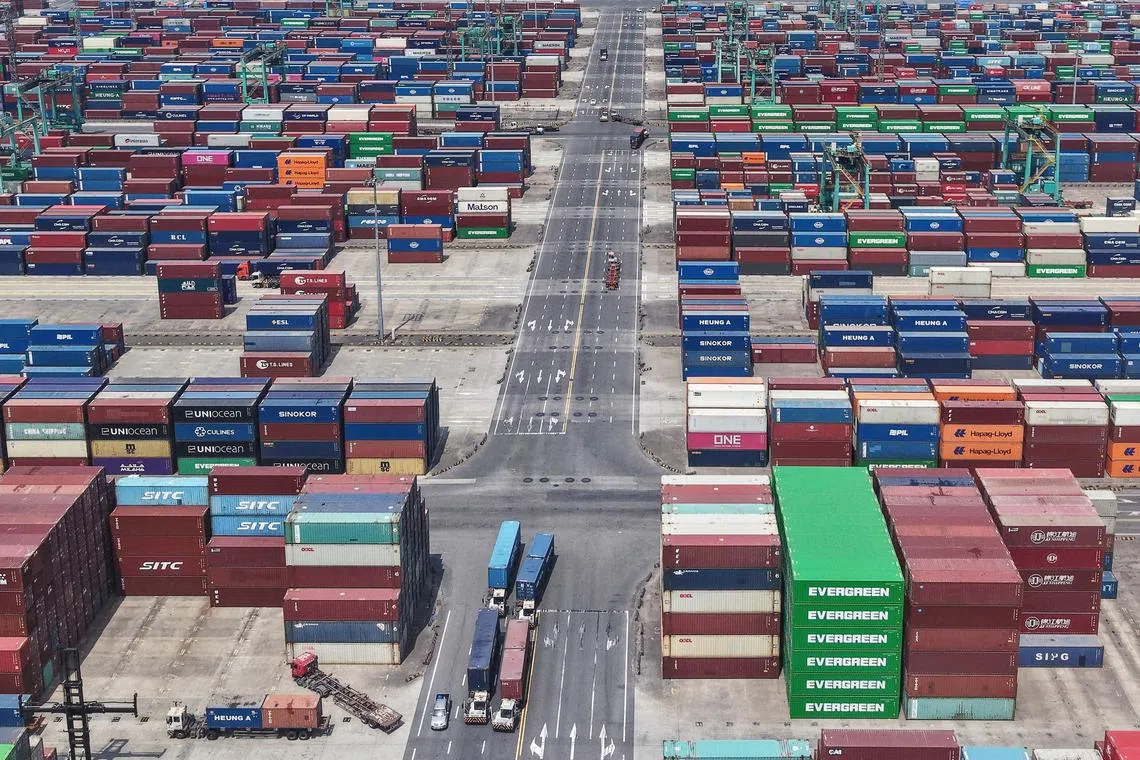China’s May exports slow, deflation deepens as US tariffs bite
Sign up now: Get ST's newsletters delivered to your inbox

Underscoring the US tariff impact, China’s exports to the United States plunged 34.5 per cent year on year in May.
PHOTO: AFP
BEIJING – China’s May exports growth slowed to a three-month low as US tariffs slammed shipments, while factory-gate deflation deepened to its worst level in two years, heaping pressure on the world’s second-largest economy on both the domestic and external fronts.
US President Donald Trump’s global trade war and the swings in US-China trade ties have in the past two months sent Chinese exporters, along with their business partners across the Pacific, on a roller-coaster ride and hobbled world growth.
Underscoring the US tariff impact on shipments, Customs data showed that China’s exports to the United States plunged 34.5 per cent year on year in May in value terms, the sharpest drop since February 2020, when the outbreak of the Covid-19 pandemic upended global trade.
Total exports from the Asian economic giant expanded 4.8 per cent year on year in value terms in May, slowing from the 8.1 per cent jump in April and missing the 5 per cent growth expected in a Reuters poll, Customs data showed on June 9, despite a lowering of US tariffs on Chinese goods which had taken effect in early April.
Imports dropped 3.4 per cent from a year ago, deepening sharply from the 0.2 per cent decline in April and worse than the 0.9 per cent downturn expected in the Reuters poll.
Exports had surged 12.4 per cent year on year and 8.1 per cent in March and April respectively, as factories rushed shipments to the United States and other overseas manufacturers to avoid President Trump’s hefty tariffs on China and the rest of the world.
While exporters in China found some respite in May as Beijing and Washington agreed to suspend most of their tariffs for 90 days, tensions between the world’s two largest economies remain high and negotiations are under way over issues ranging from China’s rare earth controls to Taiwan.
Trade representatives from China and the US are meeting in London on June 9 to resume talks
“Export growth was likely stalled by heavy Customs inspections in May due to tightened export control efforts,” said senior economist Xu Tianchen from the Economist Intelligence Unit, noting that rare earth exports nearly halved in May, while electric machinery exports also slowed significantly.
China’s imports from the US also lost further ground, dropping 18.1 per cent from a 13.8 per cent slide in April.
Economist Huang Zichun from Capital Economics expects the slowdown in exports growth to “partially reverse this month, as it reflects the drop in US orders before the trade truce”, but cautions that shipments will be knocked again by the year end owing to elevated tariff levels.
China’s May trade surplus came in at US$103.2 billion (S$132.6 billion), up from the US$96.18 billion the previous month.
Other data, also released on June 9, showed China’s import of crude oil, coal and iron ore dropped in May, underlining the fragility of domestic demand at a time of rising external headwinds.
Beijing in May rolled out a series of monetary stimulus measures, including cuts to benchmark lending rates and a 500 billion yuan (S$89.4 billion) low-cost loan programme for supporting elderly care and services consumption.
The measures are aimed at cushioning the trade war’s blow to an economy that relied on exports
Deflationary pressures
Producer and consumer price data, released by the National Bureau of Statistics on the same day, showed that deflationary pressures worsened in May.
The producer price index fell 3.3 per cent in May from a year earlier, after a 2.7 per cent decline in April and marked the deepest contraction in 22 months, while consumer prices extended declines, having dipped 0.1 per cent in May from a year earlier.
“China continues to face persistent deflationary pressure,” said Mr Zhang Zhiwei, chief economist at Pinpoint Asset Management.
“The price war in the auto sector
US coffee chain Starbucks said on June 9 it would lower prices of some iced drinks by an average of five yuan in China. REUTERS


